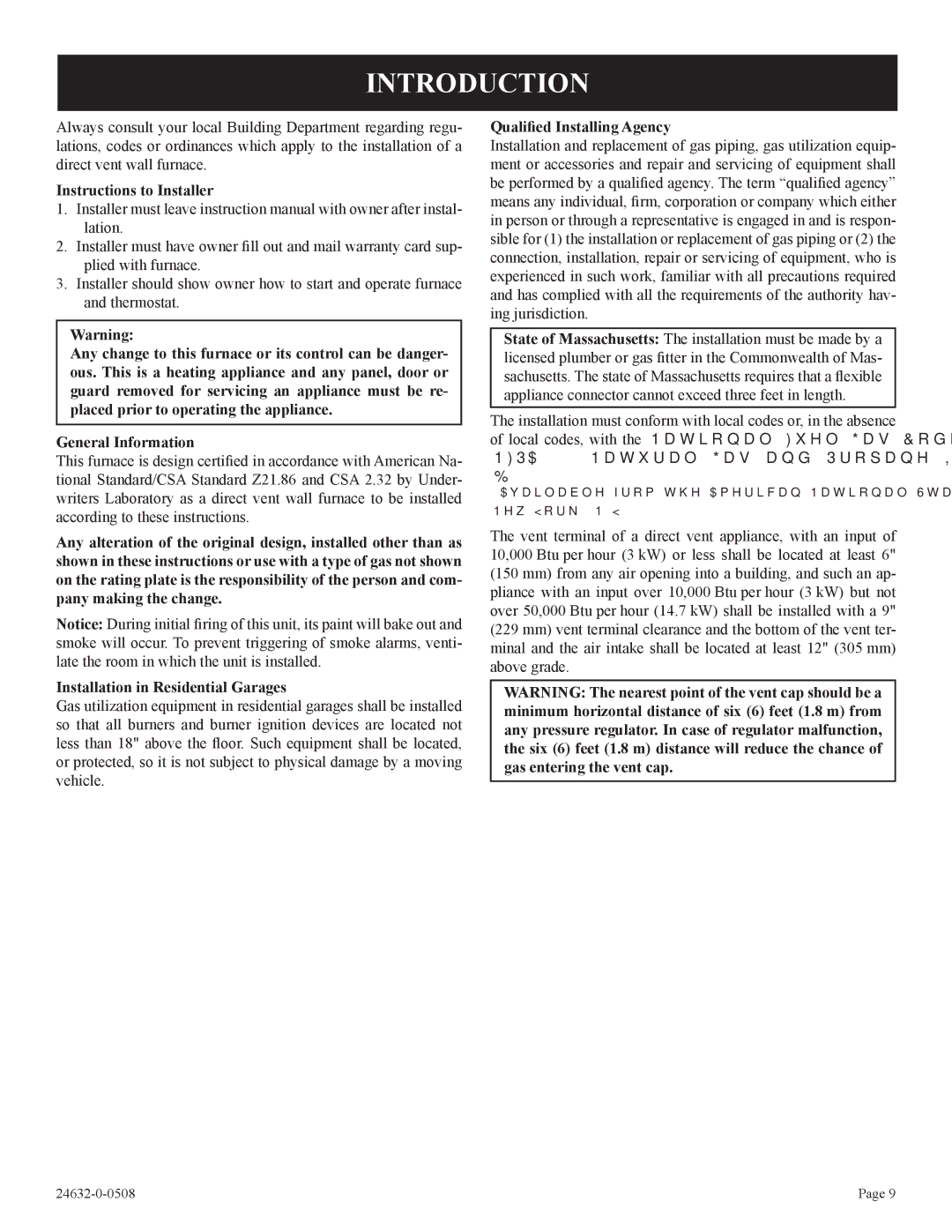
INTRODUCTION
Always consult your local Building Department regarding regu- lations, codes or ordinances which apply to the installation of a direct vent wall furnace.
Instructions to Installer
1.Installer must leave instruction manual with owner after instal- lation.
2.Installer must have owner fill out and mail warranty card sup- plied with furnace.
3.Installer should show owner how to start and operate furnace and thermostat.
Warning:
Any change to this furnace or its control can be danger- ous. This is a heating appliance and any panel, door or guard removed for servicing an appliance must be re- placed prior to operating the appliance.
General Information
This furnace is design certified in accordance with American Na- tional Standard/CSA Standard Z21.86 and CSA 2.32 by Under- writers Laboratory as a direct vent wall furnace to be installed according to these instructions.
Any alteration of the original design, installed other than as shown in these instructions or use with a type of gas not shown on the rating plate is the responsibility of the person and com- pany making the change.
Notice: During initial firing of this unit, its paint will bake out and smoke will occur. To prevent triggering of smoke alarms, venti- late the room in which the unit is installed.
Installation in Residential Garages
Gas utilization equipment in residential garages shall be installed so that all burners and burner ignition devices are located not less than 18" above the floor. Such equipment shall be located, or protected, so it is not subject to physical damage by a moving vehicle.
Qualified Installing Agency
Installation and replacement of gas piping, gas utilization equip- ment or accessories and repair and servicing of equipment shall be performed by a qualified agency. The term “qualified agency” means any individual, firm, corporation or company which either in person or through a representative is engaged in and is respon- sible for (1) the installation or replacement of gas piping or (2) the connection, installation, repair or servicing of equipment, who is experienced in such work, familiar with all precautions required and has complied with all the requirements of the authority hav- ing jurisdiction.
State of Massachusetts: The installation must be made by a licensed plumber or gas fitter in the Commonwealth of Mas- sachusetts. The state of Massachusetts requires that a flexible appliance connector cannot exceed three feet in length.
The installation must conform with local codes or, in the absence of local codes, with the National Fuel Gas Code ANSI Z223.1/ NFPA 54* Natural Gas and Propane Installation Code, CSA B149.1.
*Available from the American National Standards Institute, Inc., 11 West 42nd St., New York, N.Y. 10036.
The vent terminal of a direct vent appliance, with an input of 10,000 Btu per hour (3 kW) or less shall be located at least 6" (150 mm) from any air opening into a building, and such an ap- pliance with an input over 10,000 Btu per hour (3 kW) but not over 50,000 Btu per hour (14.7 kW) shall be installed with a 9" (229 mm) vent terminal clearance and the bottom of the vent ter- minal and the air intake shall be located at least 12" (305 mm) above grade.
WARNING: The nearest point of the vent cap should be a minimum horizontal distance of six (6) feet (1.8 m) from any pressure regulator. In case of regulator malfunction, the six (6) feet (1.8 m) distance will reduce the chance of gas entering the vent cap.
Page 9 |
